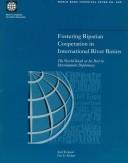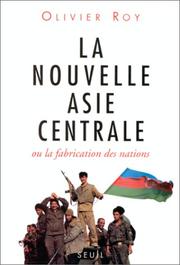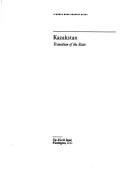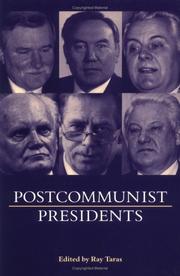| Listing 1 - 8 of 8 |
Sort by
|
Book
Year: 1997 Publisher: Brussel BDBH
Abstract | Keywords | Export | Availability | Bookmark
 Loading...
Loading...Choose an application
- Reference Manager
- EndNote
- RefWorks (Direct export to RefWorks)
Foreign trade. International trade --- Azerbaijan --- Uzbekistan --- Kazakhstan

Abstract | Keywords | Export | Availability | Bookmark
 Loading...
Loading...Choose an application
- Reference Manager
- EndNote
- RefWorks (Direct export to RefWorks)
Water supply. Water treatment. Water pollution --- Mekong --- Uzbekistan --- Kazakhstan
Book
ISBN: 1280008822 9786610008827 0585230587 Year: 1997 Publisher: Washington, D.C. : World Bank,
Abstract | Keywords | Export | Availability | Bookmark
 Loading...
Loading...Choose an application
- Reference Manager
- EndNote
- RefWorks (Direct export to RefWorks)
Structural adjustment (Economic policy) --- Kazakhstan --- Economic policy --- Politics and government
Book
Year: 1997 Volume: 81 Publisher: Liège, Belgique : Université de Liège, Service de préhistoire,
Abstract | Keywords | Export | Availability | Bookmark
 Loading...
Loading...Choose an application
- Reference Manager
- EndNote
- RefWorks (Direct export to RefWorks)
Paleolithic period --- Petroglyphs --- Cave paintings --- Excavations (Archaeology) --- Paléolithique --- Pétroglyphes --- Art rupestre --- Fouilles (Archéologie) --- Ignatiev Cave (Russia) --- Ural Mountains (Russia) --- Ignatiev, Grotte (Russie) --- Oural (Russie et Kazakhstan : Montagnes) --- Antiquities --- Antiquités

ISBN: 2020287323 9782020287326 Year: 1997 Publisher: Paris: Seuil,
Abstract | Keywords | Export | Availability | Bookmark
 Loading...
Loading...Choose an application
- Reference Manager
- EndNote
- RefWorks (Direct export to RefWorks)
Au lendemain du coup d'État conservateur qui éclate à Moscou, le 19 août 1991, contre Mikhaïl Gorbatchev et sa réforme de l'Union, la plupart des dirigeants des républiques soviétiques musulmanes approuvent les putschistes avant de proclamer, quelques jours plus tard, l'indépendance de leur pays, promulguée dans les trois mois. Les dirigeants qui, en 1991, provenaient tous de la nomenklatura soviétique, tiennent désormais un discours nationaliste, méfiant envers la Russie et ouvert en direction des Occidentaux. Comment expliquer ce retournement, comment se sont fabriquées ces nations et comment ont-elles pu surgir sans être portées par un nationalisme ancien et durable ? L'auteur, Olivier Roy, montre comment l'Union soviétique a été en réalité "une formidable machine à fabriquer des nations". La politique des nationalités qui avait été avant tout conçue pour briser les nationalismes existants - russe, ukrainien, géorgien, tatar, kazakh - a fabriqué une multitude de petits peuples concurrents, ayant en théorie autant de droits que les grands. Des nationalismes qui n'existaient pas ont ainsi été sollicités. A partir du système soviétique, les nouvelles élites se sont attachées à un cadre national, mais sans chercher à construire une culture et encore moins une idéologie nationaliste. Dans les nouvelles nations musulmanes d'Asie centrale - Turkménistan, Ouzbékistan, Kirghizstan, Kazakhstan et Azerbaïdjan - de nouvelles sociétés civiles se sont reconstruites, non pas parallèlement mais dans le cadre même des institutions soviétiques, en lui empruntant non seulement la grammaire sociale (communautarisme), mais la logique même de son instauration comme nation. En prenant une perspective historique, Olivier Roy s'efforce de mettre au jour ce processus de fabrication des nations, de recomposition des groupes de solidarité traditionnels et d'émergence de nouvelles élites nationalistes à partir du cadre soviétique.
Nationalism --- Nationalisme --- Asia, Central --- Asie centrale --- History --- Politics and government --- Histoire --- Politique et gouvernement --- SU / Soviet Union - Ussr - Urss --- AZ / Azerbaijan - Azerbaidzjan - Azerbaidjan --- KG / Kyrgyzstan - Kirghizistan --- KZ / Kazakhstan --- TM / Turkmenistan --- UZ / Uzbekistan - Oezbekistan - Ouzbekistan --- 323.0 --- 92 --- Binnenlandse politiek: algemeenheden. --- Geschiedenis. --- Histoire. --- History. --- 92 Geschiedenis. --- 92 Histoire. --- 92 History. --- Asia [Central ] --- 1991 --- -Asia [Central ] --- Asia [Central] --- -Asia [Central] --- Nationalism - Asia, Central --- Asia, Central - Politics and government - 1991 --- -Asia, Central - History --- ASIE CENTRALE --- U.R.S.S. --- TURKMENISTAN (U.R.S.S.) --- OUZBEKISTAN (U.R.S.S.) --- KIRGHIZSTAN --- TADJIKISTAN (U.R.S.S.) --- KAZAKHSTAN --- AZERBAIDJAN --- HISTOIRE --- 20E SIECLE

ISBN: 0821339028 Year: 1997 Publisher: Washington, D.C. World Bank
Abstract | Keywords | Export | Availability | Bookmark
 Loading...
Loading...Choose an application
- Reference Manager
- EndNote
- RefWorks (Direct export to RefWorks)
Structural adjustment (Economic policy) --- 328 <574> --- 338.24 <574> --- 328 <574> Parlement. Volksvertegenwoordiging. Regering en parlement--Kazakstan --- Parlement. Volksvertegenwoordiging. Regering en parlement--Kazakstan --- 338.24 <574> Instrumenten van de economische politiek. Economische orde. Economisch politieke maatregelen. Stabilisering. Stimuleringsmaatregelen. Regulering. Financiele steunmaatregelen--Kazakstan --- Instrumenten van de economische politiek. Economische orde. Economisch politieke maatregelen. Stabilisering. Stimuleringsmaatregelen. Regulering. Financiele steunmaatregelen--Kazakstan --- Economic policy --- Kazakhstan --- Politics and government --- Economic conditions. Economic development
Book
ISBN: 1462394795 1452785961 1280974842 9786613746450 1463906935 Year: 1997 Publisher: Washington, D.C. : International Monetary Fund,
Abstract | Keywords | Export | Availability | Bookmark
 Loading...
Loading...Choose an application
- Reference Manager
- EndNote
- RefWorks (Direct export to RefWorks)
This paper reviews economic developments in the Republic of Kazakhstan during 1993–97. During 1993–94, price liberalization was virtually completed, most of the restrictions on foreign trade were eliminated, and a new currency with a unified rate was introduced. At the same time, state orders were phased out and privatization initiated. Since early 1996, the authorities have accelerated privatization, extending it to many large enterprises. Kazakhstan has also taken major steps toward banking and financial sector reform, through withdrawal of bank licenses, bank consolidation, introduction and enforcement of prudential regulations, and enhanced supervision.
Banks and Banking --- Exports and Imports --- Foreign Exchange --- Macroeconomics --- Public Finance --- Taxation --- National Government Expenditures and Related Policies: General --- Banks --- Depository Institutions --- Micro Finance Institutions --- Mortgages --- Comparison of Public and Private Enterprises and Nonprofit Institutions --- Privatization --- Contracting Out --- Trade: General --- Trade Policy --- International Trade Organizations --- Public finance & taxation --- Currency --- Foreign exchange --- Banking --- International economics --- Expenditure --- Commercial banks --- Exports --- Economic sectors --- Tariffs --- Taxes --- International trade --- Expenditures, Public --- Banks and banking --- Tariff --- Kazakhstan, Republic of

ISBN: 0521587654 0521582822 Year: 1997 Publisher: Cambridge Cambridge University Press
Abstract | Keywords | Export | Availability | Bookmark
 Loading...
Loading...Choose an application
- Reference Manager
- EndNote
- RefWorks (Direct export to RefWorks)
Political systems --- Politicians. Diplomats --- anno 1990-1999 --- Eastern and Central Europe --- Kazakhstan --- Presidents --- Post-communism --- Présidents --- Postcommunisme --- Europe, Eastern --- Former Soviet republics --- Europe de l'Est --- Ex-URSS --- Politics and government --- Politics and government. --- Politique et gouvernement --- -Presidents --- -Post-communism --- -#SBIB:328H262 --- #SBIB:324H40 --- #SBIB:328H27 --- Postcommunism --- World politics --- Communism --- Presidency --- Heads of state --- Executive power --- Instellingen en beleid: Rusland en het GOS --- Politieke structuren: algemeen --- Instellingen en beleid: Midden- en Centraal Europa: algemeen --- -CIS countries --- Commonwealth of Independent States countries --- Ex-Soviet republics --- Ex-Soviet states --- Former Soviet states --- New Independent States (Former Soviet republics) --- Newly Independent States (Former Soviet republics) --- NIS (Former Soviet republics) --- East Europe --- Eastern Europe --- -Politics and government --- Présidents --- #SBIB:328H262
| Listing 1 - 8 of 8 |
Sort by
|

 Search
Search Feedback
Feedback About UniCat
About UniCat  Help
Help News
News